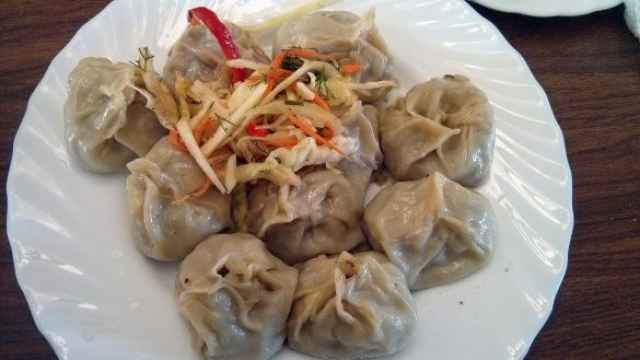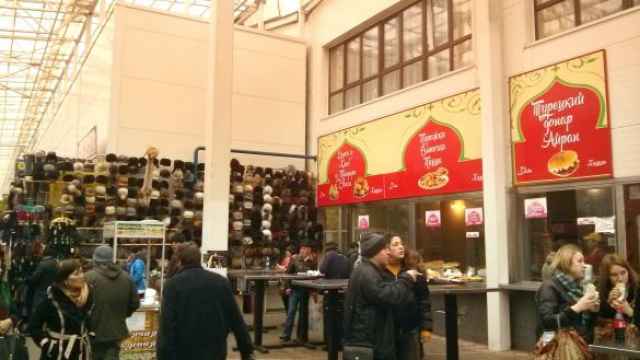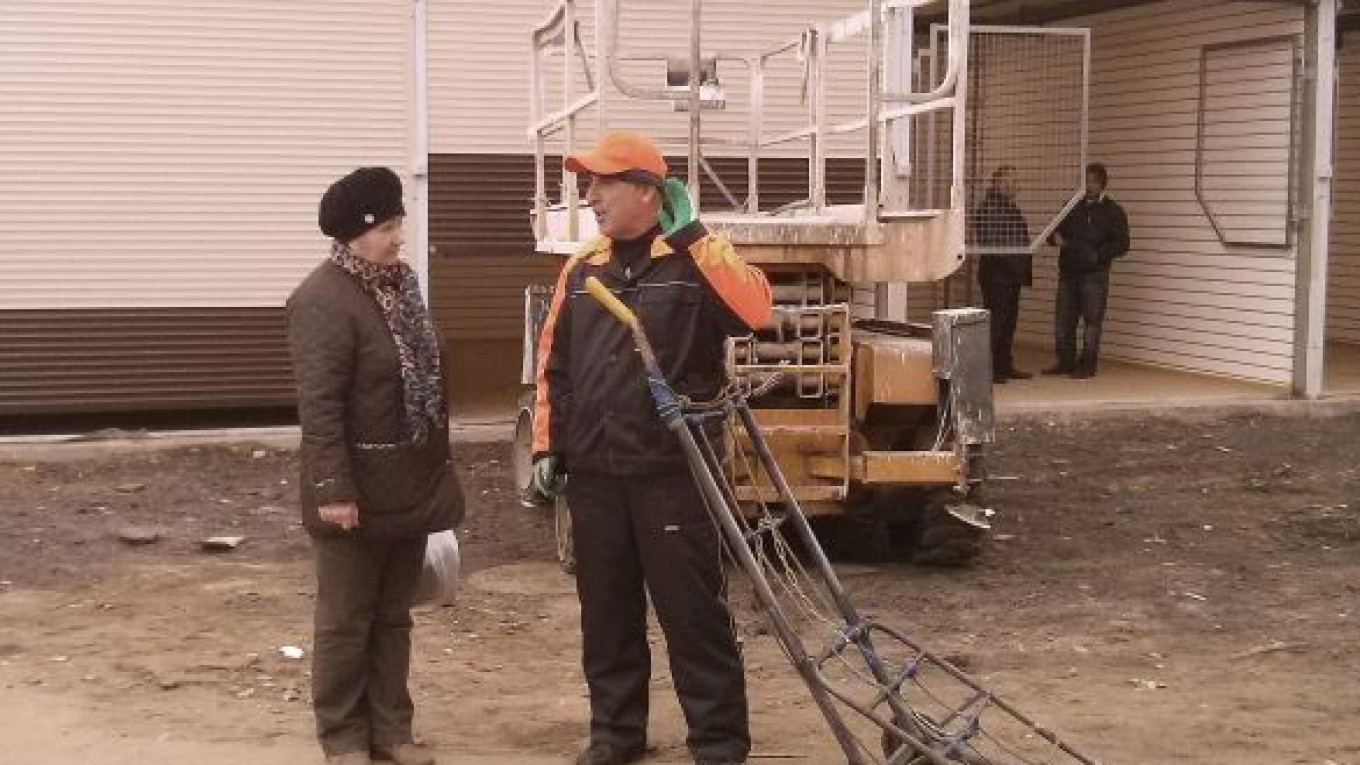It's 6 a.m. and still dark outside.
I am standing inside the sprawling Sadovod market on the 14th kilometer of the Moscow Ring Road in southeast Moscow. A sweeper is working one of the deserted rows of shops, trying to put things in order after yesterday's mess.
A day earlier, on Oct. 28, police detained about 1,000 workers at Sadovod, the city's biggest street market, during a crackdown on illegal migration. Moscow authorities have pledged an all-out war on illegals after violence rocked two other city markets in the past four months.
I lucked out and missed the Sadovod raid by a day. I had made a contact at the market, Firuz, who had agreed to help me secure a job there. Posing as an unemployed Tajik migrant, I wanted to find out what it is like to work as a gastarbeiter, or guest worker, in Moscow.
Firuz called me up on the phone just as the raid was unfolding. "Hey man, you are late, there's a raid!" he said. "The police are catching everyone!"
Firuz is a 26-year-old Tajik who runs a children's apparel shop owned by his father. After working at various city markets for about 20 years, they have purchased four or five apartments in Moscow and the surrounding Moscow region.
He and other people spoke to me under condition that their last names not be published. They feared possible reprisals from the market administration and the police.
Firuz, joining me outside his shop in the dark morning hours, said the first police raid took place at Sadovod after migrant workers from the North Caucasus brutally beat a policeman in late July at the rival Matveyevsky market across town.
"I am a Russian citizen, but even I was taken to the police station," he said. "They arrested everybody without asking any questions."
Firuz said that when the bus carrying the detainees arrived at the police station, the officers bluntly told the detainees that they could enter the building or hand over money and leave.
"Three migrants paid 5,000 rubles each and left. That's how our police work," Firuz said.
Firuz did not pay the 5,000 rubles, which is worth about $155, and waited eight hours at the police station before he was released without charges.
Police had no immediate comment on the bribery allegation. But the extortion of bribes from illegal migrants and other people is common practice.

Shoppers and workers walking down one of the busy rows at the Sadovod market. (Eradzh Nidoev / For MT)
The second police raid, which took place last week, followed anti-migrant riots at another rival market, Biryulyovo, in mid-October. In that incident, scores of ethnic Russians rioted at the market to protest the failure of the police to make any arrests in the stabbing death of an ethnic Russian man. The rioters blamed the death on an Azeri national.
Firuz said police closed all the exits at the Sadovod market during last week's raid and started detaining people who looked like Asian migrants. Chaos erupted at the market, with people frantically running and hiding, he said.
Firuz said Vietnamese workers panicked the most. They did not understand what was happening, and they feared being stopped even if their documents were in order.
Most of the detained migrants returned to work the next day, Firuz said. They work at Sadovod legally. It's not hard to get the residency permit required by the police. The difference between a real and fake permit is just 1,000 rubles ($30).
"They would definitely detain you," Firuz told me.
I smiled.
"I'm not kidding, believe me," Firuz said, testing whether I really want to start a new career at the market, a cavernous complex housing hundreds of shops that sell everything from hairdryers and phones to shoes, household plants and pets.
I was born in Tajikistan, but I have spent all of my 23 years in Russia. I have nearly forgotten my native language.
Sadovod vendors have their own explanation about the Biryulyovo rioting. They think the clashes were ordered by two businessmen, Zarakh Iliyev and God Nisanov, who own both Sadovod and another market, Yuzhny Vorota, in an effort to get rid of rivals.
"Our Jews handed over the money, and the authorities shut down Biryulyovo," Firuz said. He voiced confidence that Sadovod would not be ordered closed by the authorities like Matveyevsky and Biryulyovo were.
Contact information for Iliyev and Nisanov could not be found to ask them for a comment for this story.

The market's black-and-orange uniform costs 1,700 rubles and is required wearing. (Eradzh Nidoev / For MT)
3 Options for a Job
Firuz and I started talking about what kind of job I could fill at the market. I had three options: to become a sweeper, a porter or a vendor.
To work as a sweeper is the easiest job. You collect a daily salary of 400 rubles ($12) for pushing a broom along one of the market's many rows.
The job of a porter is much harder. First, you have to pay 1,700 rubles ($52) for a black-and-orange uniform and a birka, a card that shows you have the right to work at the market. Then you have buy a cart and pay a daily fee of 400 rubles to use it at the market. When I asked why I would have to pay to use my own property, the other workers stayed silent. This is simply how business is done here.
The next problem is finding a client who needs a porter to move something. Otherwise you won't earn anything.
Vendors are at the top of the market's hierarchy. They just sit in the shops and sell goods. Firuz hawks the children's clothing with his 18-year-old nephew Karim.
But working as a vendor proved boring. I did not even sell a pair of socks over the course of two hours.
Instead, I sat in a chair and watched a sweeper move up and down the row. His name is Ilkhom, he is from Tajikistan, and his Russian leaves much to be desired. He has been working at the market for about five months, and his monthly salary amounts to 20,000 rubles ($615), a quarter of which he sends home to his parents. He lives with 11 other migrants in a three-room apartment not far from the market.
Karim introduced me to an elite porter named Sakhovat, who told me that he earns 5,000 to 6,000 rubles a day. In theory he could earn up to 150,000 rubles ($4,610) a month. Sakhovat, I am told, is the only porter with such a high income because he has worked at Sadovod since it first opened in 2008 and has developed a loyal clientele. He likes Moscow and his life. "What can I complain about?" he asked me rhetorically.
A haunting Arabic melody echoed through the market. The time has come for Muslims to pray. Firuz went inside his shop to kneel down on a rug.?

A bird's-eye view of the sprawling Sadovod complex as seen on the market's official website, oaosadovod.ru.
Convincing the Supervisor
After eating a lunch of manty, Tajik meat-stuffed dumplings, Firuz and I went to a market supervisor to talk about my employment as a porter. When the supervisor saw my Russian passport, he was shocked. "Are you kidding me?" he asked Firuz in Tajik.
Upon returning to the supervisor's office the next day, a Wednesday, the man quizzed me about my last job. I replied in Tajik with a thick Russian accent that I had worked at McDonald's. It was the first answer that sprang to mind.
Without connections, it is not easy to become a gastarbeiter at Sadovod.
"If I didn't know Firuz, I would never hire you," the supervisor told me. "I know him and his father. But who knows? Maybe you will steal everything. I am responsible for you."Worker turnover is high at the market, which employs several thousand people. About 20 new workers come and another 20 leave every day, the supervisor said. Asked about illegal workers, he said that he knew of only two dozen or so people who had been caught and had to leave the country.
The supervisor asked for my home address in Tajikistan. I remembered the district where my relatives live. But I tried to speak as little as possible because I was afraid that my Russian accent would give me away. Fortunately, the supervisor didn't seem to notice. He gave me permission to work and a uniform. Since I was just starting out, he also said he would give me a break for the first two days and not to charge me the daily 400-ruble cart fee.
Then I started searching for a cart, which proved to be an adventure in itself. I negotiated with numerous workers to sell me one as cheap as possible because I was poor. Actually, I was poor, having allotted myself only 3,300 rubles ($100) for the whole week. That was all the money in my pocket.
I wound up spending 1,700 rubles for the uniform and 1,300 rubles ($40) for the cart, leaving 300 rubles ($9) to live on. Sakhovat, the elite porter, taught me how to tie up goods in the cart. I put on the orange uniform jacket but I did not don the trousers, prompting Sakhovat to warn me that I might get in trouble.
"You should wear the full uniform," he said. "Otherwise you have to pay a fine. A security guard might even punch you."
I did not take the warning seriously. I wanted to get to work.

The cart that was purchased and used by a Moscow Times reporter. (Eradzh Nidoev / For MT)
Hunting for a Client
But my first day proved disappointing. I earned absolutely nothing. The competition between porters is high. I wandered with my cart up and down the rows, shouting with a fake accent, "Telezhka nado?" (Do you need a cart?). Nobody needed me.
I befriended another porter, and we started speaking in Tajik. When I complained about the lack of clients, the porter advised me to be more persistent and recommended my work to several shopkeepers. He also told me which rows at the market tended to provide the most work.
But after another hour of hunting, I came back to Firuz's shop empty-handed. Firuz and Karim laughed at me. They were amused to see a Muscovite with a higher education unable to find a client.
"Did you really think it would be easy?" Firuz asked.
Firuz told me that most workers only made their first profit after several weeks or even months. He said he did not want to work at the market but could not find another job in Moscow because of widespread discrimination against people from the North Caucasus and Central Asia.
"I am a Russian citizen, but nobody will hire me because I am a Tajik," he said. "I earned a higher education here, but when potential employers find out about my nationality, they just hang up."
Although I failed to find any clients after 10 hours of work, I felt exhausted after my first full day at the market. I returned to my apartment and wondered how the older porters managed to survive the job every day.
On Thursday, I woke up confident that I would find a client. I got up at 4 a.m. after a night spent tossing and turning as I worried about being late to work. My head pounded from the lack of sleep, and I felt a cold coming on. But I had to go to work.
Shortly after arriving at the market, I paused to rest against my cart in a narrow lane between two rows of shops. A security guard immediately approached me and asked for my market-issued work permit card. I had forgotten it at home. Another porter came to the rescue and asked the guard to let me go just this once. After the guard relented and left, the porter warned me that the market administration and security guards might beat me for breaking the rules.

The lunch of manty that I ate before approaching the supervisor to ask for a job. (Eradzh Nidoev / For MT)
A Miracle From Penza
When I started the job, I thought that hauling goods would be hard work. It turned out that the harder job was finding clients with goods to haul. Shoppers usually have their own bags or carts, or they turn to porters they know personally. The other porters seemed ready to do anything for money. They nearly grabbed goods from one another as they jostled the few shoppers who needed a hand.After an hour of wandering around, I finally found someone who wanted help: a woman who was shopping for goods to take back to her own little market in Penza, located 625 kilometers southeast of Moscow.
I had to work fast, loading the goods, tying them up, and racing with the cart to her car without hitting anyone. But I was tired and worked slowly. Fortunately for me, the woman helped me instead of yelling. I apologized to the woman for my slowness.
"Today is my first day," I said.
"Don't worry," she said with a kind smile. "You will learn. If you don't, life will teach you."
"Have you ever thought about moving to Moscow?" I asked.
"Why? I have a good life in Penza," she said. "I have a big house and a car. Here we are scum, but there I am a lady. I wear beautiful dresses and drive a car."
The woman gave me 500 rubles ($15). It was my first money. Finally I could eat. Famished, I bought five sambusi, a traditional Tajik fried pastry with a savory filling, for 50 rubles ($1.50) apiece and returned to Firuz's shop.
As I helped Firuz fold clothes, the conversation turned to Islam. Firuz urged me to become more spiritually active and to pray five times a day as he did. I promised to think about it.
Then I set out to find another client. No luck.

A market cafe selling pizza, meat pies and other foods that meet Islamic Halal law. (Eradzh Nidoev / For MT)
Hard Work, Hard Life
Back at the children's apparel shop a couple hours later, Firuz rushed in and said he had heard that police were raiding a corner of the market. I grabbed my camera and passport, and we ran to the scene. The rumor turned out to be false. No police were in sight.
Despite a widespread belief that chaos thrives at Moscow's markets, the workers and shoppers at Sadovod appeared to treat one another well. I did not see any fighting or quarreling. I asked about human rights violations, but Firuz could not remember any specific instances. He said the security guards maintained order, and they only punished people who broke the rules.
Karim said he knew of only a single incident where security guards had struck a migrant worker. He said the worker had stolen a female shopper's purse.
Back at home that night, I felt even more tired than the first day, if that was possible. My new life seemed so unfamiliar. The daily rigmarole made the troubles in my usual life seem foolish. At the market, everything was simple: find a client or leave. It was a game of survival.
Still I didn't want to give up. Another day awaited me.
Or not.
Firuz called me that evening and asked me to stay away from the market for a while. I had given myself away while chatting with him in accent-free Russian. A neighboring vendor had eavesdropped on our conversation and started telling fellow traders that I was a journalist writing a story about the market.
"This is private property. They can do anything to you," Firuz said.
I thought Firuz was exaggerating. But I understood that he didn't want to get in trouble, so I promised not to return.
A sense of sadness engulfed me. I had just started to get a taste of a gastarbeiter's life in Moscow.
Contact the author at newsreporter@imedia.ru.
A Message from The Moscow Times:
Dear readers,
We are facing unprecedented challenges. Russia's Prosecutor General's Office has designated The Moscow Times as an "undesirable" organization, criminalizing our work and putting our staff at risk of prosecution. This follows our earlier unjust labeling as a "foreign agent."
These actions are direct attempts to silence independent journalism in Russia. The authorities claim our work "discredits the decisions of the Russian leadership." We see things differently: we strive to provide accurate, unbiased reporting on Russia.
We, the journalists of The Moscow Times, refuse to be silenced. But to continue our work, we need your help.
Your support, no matter how small, makes a world of difference. If you can, please support us monthly starting from just $2. It's quick to set up, and every contribution makes a significant impact.
By supporting The Moscow Times, you're defending open, independent journalism in the face of repression. Thank you for standing with us.
Remind me later.


